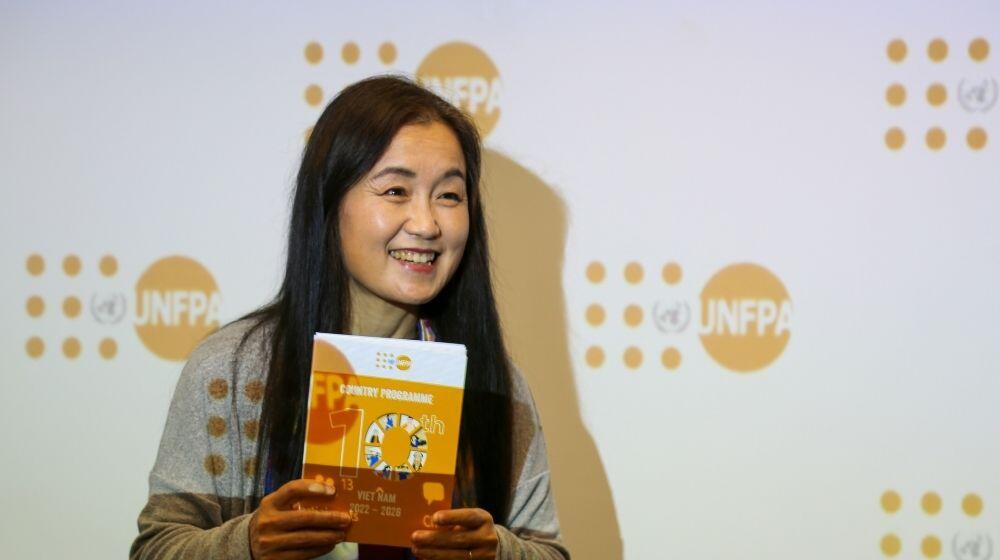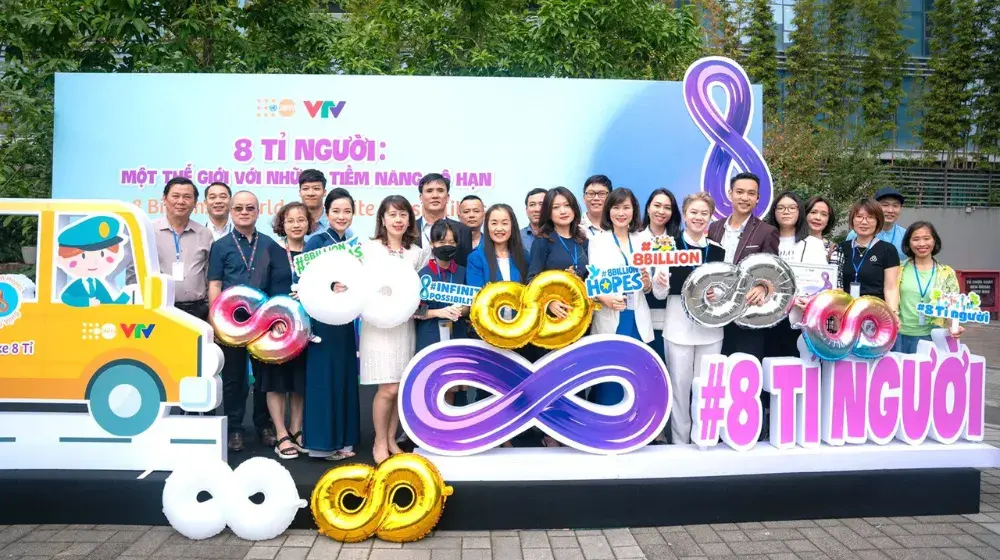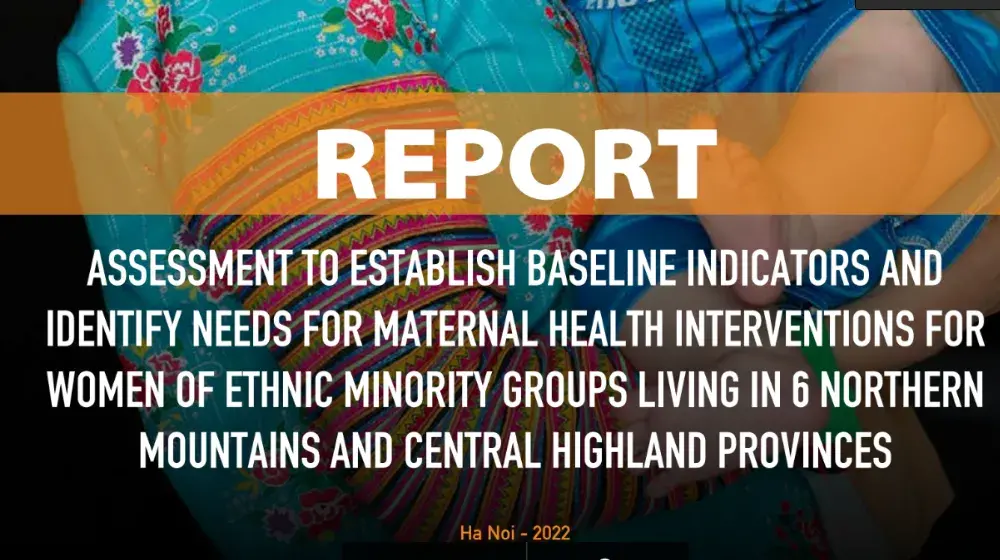Honorable Ms. Nguyen Thi Dieu Trinh, Deputy Director of the Foreign Economic Relations Department, Ministry of Planning and Investment;
UNFPA colleagues;
Online participants and media colleagues;
On behalf of UNFPA, I am much honored to be here today, for the closing of the 9thCountry Programme (2017-2021) and the opening of the 10th Country Programme (2022-2026). I would like to thank all organisations and individuals who have contributed to the delivery of UNFPA-supported programmes in Viet Nam during the 9th Country Programme (CP9) including the Government Ministries as coordinated by the Ministry of Planning and Investment, the National Assembly, various National Committees, mass and civil organisations, development partners such as Australian DFAT, KOICA, Norway and Japan, private sector entities such as MSD, Bloomberg and Vital Strategies, media partners, and the sister UN agencies.
UNFPA has been operating in Viet Nam for 45 years, and Viet Nam is one of those longest serving countries that UNFPA works in the world. During the course of CP9, we have made a lot of achievements, which we will watch in a video clip shortly in a few minutes. But it is important to remind ourselves of some of the key breakthroughs we ensured from the implementation of the outgoing programme, and these include:
- Strategic partnerships and resource moblisation. CP9 made UNFPA Viet Nam broaden its partnership base beyond UNFPA’s core funding, including not only traditional donors such as Australian DFAT, KOICA, Norway and Japan, but also non-traditional partners including private sector entities such as MSD, Bloomberg and Vital Strategies. As a result, annual budgets increased almost by 3 times by the end of CP9. For the programme delivery, UNFPA was the only UN agency which has had Government approved civil society partners to reach out to population groups in need.
- Innovation. CP9, and particularly in the COVID-19 context, drove us to innovate and try different ways of reaching out to vulnerable groups. Tele-health in SRH was piloted for the first time in Viet Nam particularly for ethnic minority regions, and the very first mobile app for the elderly care was introduced. CSE for young people was provided for the first time online, and innovative and digital technology was extensively used for the prevention and response to gender-based violence and GBSS. The 2019 Population and Housing Census as well as the 2019 National Study on Violence against Women were exceptionally successful in the application of the newest ICT technology to speed up data collection and analysis process and minimize human errors.
- Humanitarian action. Recognising the effect of climate change, and particularly in response to the 2020 floods and downpours of rain in the central part of Viet Nam, mobile outreach was done to protect the lives of pregnant women and couples who are planning for childbearing. Risks of gender-based violence in emergencies never brought up for the first time in Viet Nam’s history, and we made sure that vulnerable population groups were well aware of GBV risks, through digital technologies and the delivery of dignity kits which were done for the very first time in Viet Nam as well.
In the 10th Country Programme. We will be accelerating and consolidating the interventions that we have started in CP9 and particularly in light of the fact that we have only 8 years left towards SDGs by 2030.
Building on the success of CP9, CP10 will aim at achieving the results of UNFPA’s corporate Strategic Plan, towards Viet Nam with Zero preventable maternal deaths, Zero unmet need for family planning, and Zero gender-based violence and other harmful practices. CP10 is fully in alignment with the new UN Sustainable Development Cooperation Framework for Viet Nam to fulfil the transformative promise of “Leaving no one behind” by directly contributing to 2 priority areas: First on Inclusive Social Development, and second on Governance and Access to Justice, thus reducing inequalities and vulnerabilities.
The CP10 aims at achieving results in the following programme portfolios:
- Adolescents and Youth
- Population Ageing and Social Protection
- Equitable Access to Sexual and Reproductive Health and Rights
- Data and Evidence for Policy and Programme Making
- Prevention and Reduction of Gender-Based Violence and Harmful Practices
- Multi-sectoral Response to Gender-Based Violence and Harmful Practices.
Given Viet Nam’s vulnerability to the effects of climate change, UNFPA will provide humanitarian support in all programme areas, but particularly with a focus on the provision of integrated sexual and reproductive health care, the prevention and response to gender-based violence, and support for the elderly population groups. The rights and choices of women and girls, young people and older persons affected by humanitarian crises will be prioritized, leaving no one behind.
To achieve the goal and objectives of the CP10, UNFPA will partner with the Government, national institutions and CSOs fully in line with the principles of national ownership and mutual accountability. UNFPA and the Government of Viet Nam, through the Ministry of Planning and Investment as the Government coordinating agency, will be jointly accountable for the management of the programme, and will plan, monitor and evaluate programme implementation using the results-based management approach.
I am confident that the partnership between UNFPA and Viet Nam will continue to thrive, and I am happy to reaffirm our continuing commitment for Viet Nam to “delivering a world where every pregnancy is wanted, every childbirth is safe and every young person's potential is fulfilled”. Once again, I would like to sincerely thank you for your dedication and hard work in making the CP9 an extraordinary success and for being ready for much more results from CP10.
Xin cam on!





